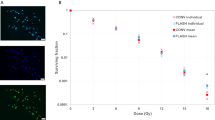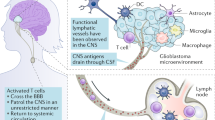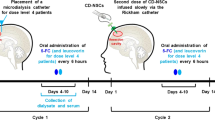Abstract
Progress in the definition of the roles of various costimulators and cytokines in determining the type and height of immune responses has made it important to explore genetically altered tumor cells expressing such molecules for therapeutic immunizations. We have studied the effect of therapeutic subcutaneous (s.c.) immunizations on the growth of preexisting intracerebral brain tumor isografts in the rat. Transfectant glioma cell clones expressing either rat interferon-γ (IFN-γ), rat interleukin-7 (IL-7), or rat B7-1 were selected. After irradiation (80 Gy) the clones were used for immunization (administered in up to four s.c. doses in a hind leg over 14-day intervals starting 1 day after the intracranial isografting of the parental tumor). Significant growth inhibition of the intracerebral parental tumors was induced by transfectants expressing IFN-γ and IL-7, respectively. The strongest effect was observed with IFN-γ-expressing cells, resulting in cures in 37% of the males and in 100% of the females. Immunization with IL-7 had a similar, strong initial effect, with significantly prolonged survival in the majority of the rats but a lower final cure rate (survival for >150 days). The B7-1-expressing tumor clones induced cures in seven of eight female rats; however, no cures were seen in the male rats. It was also shown that the B7-1-expressing cells were themselves strongly immunogenic in female rats, requiring high cell numbers to result in a progressively growing tumor upon s.c. isografting; this was not the case in male rats. As a whole, the results imply that despite the unfavorable location of intracerebral tumors, therapeutic s.c. immunizations with certain types of genetically altered tumor cells can induce complete regressions with permanent survival and without gross neurological or other apparent signs of brain damage. The present results demonstrate complete regressions when immunizations are initiated shortly after intracranial isografting, when the intracerebral tumor is small.
This is a preview of subscription content, access via your institution
Access options
Subscribe to this journal
Receive 12 print issues and online access
$259.00 per year
only $21.58 per issue
Buy this article
- Purchase on Springer Link
- Instant access to full article PDF
Prices may be subject to local taxes which are calculated during checkout
Similar content being viewed by others
Author information
Authors and Affiliations
Corresponding author
Rights and permissions
About this article
Cite this article
Visse, E., Siesjö, P., Widegren, B. et al. Regression of intracerebral rat glioma isografts by therapeutic subcutaneous immunization with interferon-γ, interleukin-7, or B7-1-transfected tumor cells. Cancer Gene Ther 6, 37–44 (1999). https://doi.org/10.1038/sj.cgt.7700023
Received:
Accepted:
Published:
Issue Date:
DOI: https://doi.org/10.1038/sj.cgt.7700023
Keywords
This article is cited by
-
Radiation sterilisation of cultured human brain tumour cells for clinical immune tumour therapy
British Journal of Cancer (2004)
-
Human U251MG glioma cells expressing the membrane form of macrophage colony-stimulating factor (mM-CSF) are killed by human monocytes in vitro and are rejected within immunodeficient mice via paraptosis that is associated with increased expression of three different heat shock proteins
Cancer Gene Therapy (2003)
-
Immunologic approaches to therapy for brain tumors
Current Neurology and Neuroscience Reports (2001)
-
B7.1 expression by the weakly immunogenic F98 rat glioma does not enhance immunogenicity
Gene Therapy (2000)
-
The treatment of established intracranial tumors by in situ retroviral IFN-γ transfer
Gene Therapy (2000)



